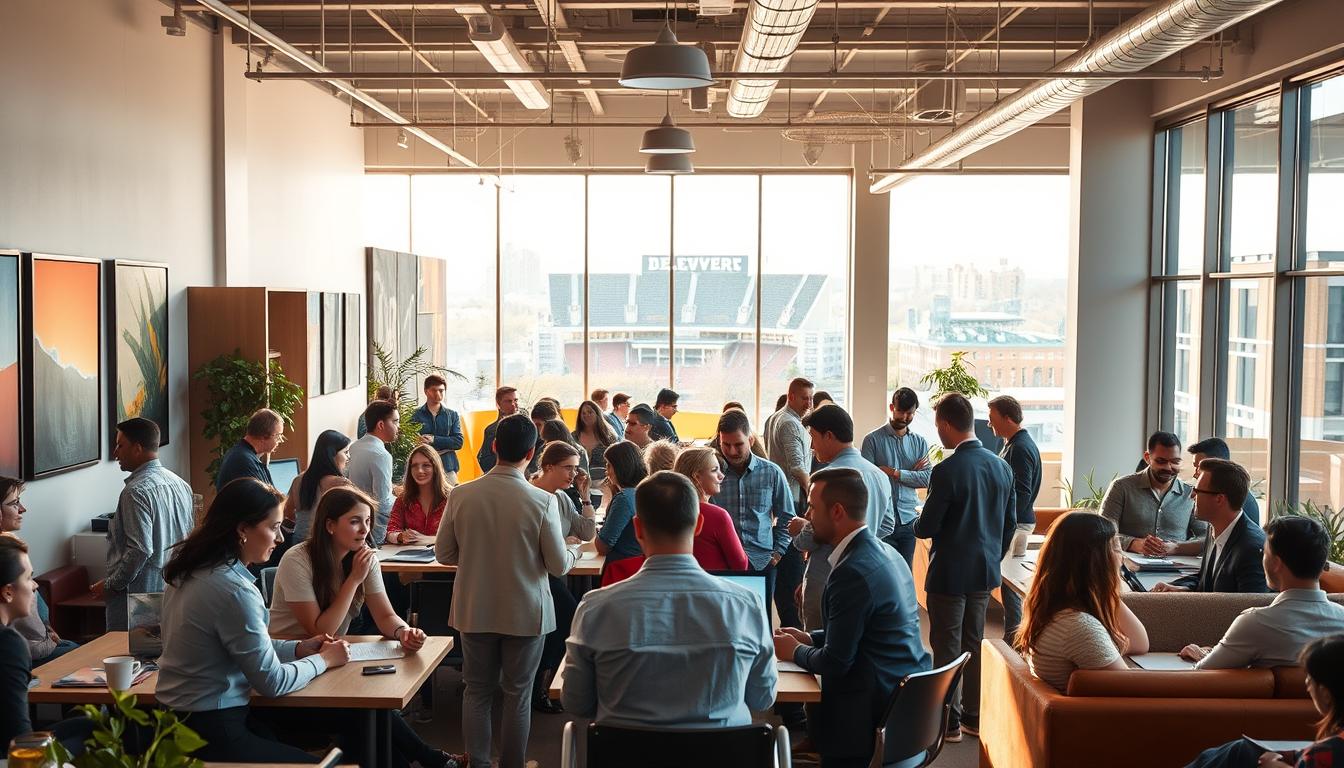Did you know Penn State football games pump over $300 million annually into the local economy? That’s just one example of how this region thrives. Nestled in central Pennsylvania, State College—affectionately called Happy Valley—is more than a college town. It’s a hub where creativity meets community spirit.
Over the past year, I’ve watched small businesses here turn challenges into opportunities. From cozy coffee shops to tech startups, these ventures shape the area’s identity. What makes this place special? It’s the blend of Penn State’s resources and homegrown passion.
Community events like arts festivals and farmers’ markets showcase local talent. Partnerships between the university and small businesses fuel innovation. Even during tough times, people here find ways to support each other. That’s the Happy Valley way.
Key Takeaways
- Penn State’s influence drives significant economic activity in the region
- Happy Valley’s nickname reflects its tight-knit, optimistic community
- Small businesses adapt creatively to market changes and challenges
- Educational partnerships accelerate entrepreneurial growth
- Local events highlight the area’s unique culture and innovation
Local Entrepreneurs Making a Difference in State College
Walking through downtown last week, I noticed something special—the streets buzzed with new energy. Storefronts once vacant now host pop-up galleries and tech incubators. This revival didn’t happen by accident.
Community Impact Through Innovative Ideas
Creative solutions define this area’s spirit. Take the holiday tree lighting events organized by downtown leaders—they’ve tripled foot traffic for nearby shops. One café owner told me, “These gatherings remind people why they love supporting us.”
Artisan markets now feature QR codes linking to vendor stories. This blend of tradition and tech helps customers connect with makers. Penn State students often collaborate on these projects, blending academic insights with real-world needs.
Funding, Grants, and Local Support Programs
Behind every success story lies robust support. The LaunchBox network offers free legal guidance to startups—a lifeline during the pandemic’s toughest months. CBICC’s mentorship programs pair seasoned executives with new business owners.
- Invent Penn State grants fund 20+ ventures yearly
- Downtown Improvement District hosts low-cost marketing workshops
- Local banks offer microloans with 0% introductory rates
These resources create a safety net, letting innovators focus on growth rather than survival. As one bakery owner shared, “We’re not just building businesses—we’re strengthening our home.”
Entrepreneurial Collaborations and Local Networks
What struck me most during a recent panel discussion was how collaboration fuels growth here. Over 350 ventures now call downtown home, creating a web of support that turns ideas into action. This synergy isn’t accidental—it’s carefully nurtured.
Insights from the Downtown State College Improvement District
The DSCID team shared how they balance preservation with progress. “We help shops navigate zoning laws while hosting events that draw crowds,” one member explained. Their monthly “Business Builder” workshops connect owners with marketing experts and Penn State students seeking real-world projects.
Newcomers benefit from mentorship programs pairing them with seasoned leaders. A bakery owner told me, “My mentor helped me negotiate lease terms and streamline operations within weeks.” These relationships prevent common startup pitfalls.
Building Relationships with CBICC and Penn State Initiatives
CBICC bridges gaps between small businesses and policymakers. Last spring, they helped a tech startup secure grants by demonstrating its potential to create jobs. Penn State’s innovation hubs provide labs and co-working spaces where students test concepts alongside established companies.
Quarterly mixers at the university’s outreach center spark unexpected partnerships. A recent team-up between engineering students and a coffeehouse led to an app tracking sustainable bean sourcing. As one participant noted, “These programs turn challenges into stepping stones.”
Success Stories from the Heart of Happy Valley
The aroma of hops and the clink of ceramic mugs tell stories of resilience in our backyard. Over the past year, I’ve seen firsthand how passion and grit transform ideas into thriving enterprises. These ventures don’t just sell products—they build connections that ripple through the area.
Antifragile Brewing Company: Crafting Community Connections
State College’s first downtown brewery became a gathering spot before pouring its first pint. “We wanted a space where game day cheers blend with Tuesday night trivia,” the founder shared. Their team partners with nearby farms for ingredients, ensuring every IPA supports regional growers.
Monthly events like “Brews & Board Games” draw crowds year-round. Collaborations with other local businesses—like pretzel deliveries from a neighboring bakery—show their community-first mission. It’s proof that craft beer can ferment more than barley.
Kara Kyle Ceramics: Creativity and Collaboration in Action
What began as a pandemic career pivot now fills kitchens with handcrafted mugs. Kara’s earthy designs gained traction through pop-up markets and social media storytelling. “People connect with the process—I share glaze experiments and workshop mishaps,” she explained.
Penn State’s arts program provided kiln access during her startup phase. Today, her studio hosts pottery classes where first-timer’s creations sit beside her work. This blend of art and education keeps her tableware in high demand at downtown boutiques.
Both ventures exemplify Happy Valley’s thriving small business community. Through seasonal events and thoughtful partnerships, they’ve turned challenges into cornerstones of local culture.
Educational and Financial Support Driving Innovation
Last month, I sat in a packed conference room watching students pitch drone delivery solutions to local farmers. This hands-on energy defines Happy Valley’s approach to growth. Behind these bright ideas? A robust network of educational programs and funding lifelines.
Invent Penn State and the Summer Founders Program
Penn State’s $30 million initiative has become a game-changer. Since 2015, their grants have launched 1,100+ ventures—from app developers to sustainable fashion brands. One engineering student told me, “The Summer Founders Program let me test prototypes while earning a stipend—something I’d never find elsewhere.”
This summer accelerator isn’t just about cash. Teams get legal services, mentorship from alumni CEOs, and free co-working space. Last year’s participants created 84 jobs and secured $2.3 million in follow-up funding. That’s real impact.
Workshops, Mentorships, and Hands-On Learning Opportunities
Weekly workshops tackle everything from TikTok marketing to patent law. I recently joined a session where entrepreneurs role-played investor negotiations—a crash course in confidence-building. “These programs help us avoid costly mistakes,” shared a bakery owner who streamlined her supply chain through mentorship.
Penn State’s innovation hubs also host 3D printing labs and product-testing focus groups. Students gain resume-worthy experience while local businesses access cutting-edge solutions. It’s a win-win that turns classroom theories into market-ready products.
As one grant recipient put it, “This support system lets us focus on solving problems, not just paying bills.” That mindset fuels Happy Valley’s culture of resilient innovation.
Conclusion
Watching students present their sustainability projects last Thursday reminded me why this region thrives. Downtown State College pulses with creative energy because people here turn ideas into action. Through education programs and smart funding, ventures grow roots while lifting the whole community.
What makes this work? It’s the blend of Penn State initiatives and grassroots passion. Grants help launch products, while organizations connect teams with mentors. Events from art walks to pitch competitions keep collaboration alive.
I’ve seen how partnerships between students and business owners spark innovation. One ceramics studio now teaches classes in a shared workspace. A brewery sources ingredients from campus gardens. These connections build a home for progress.
My takeaway? When communities invest in education and support smart programs, everyone wins. Happy Valley’s mission proves that nurturing talent today plants seeds for tomorrow’s opportunities. Here’s to keeping that spirit brewing.


